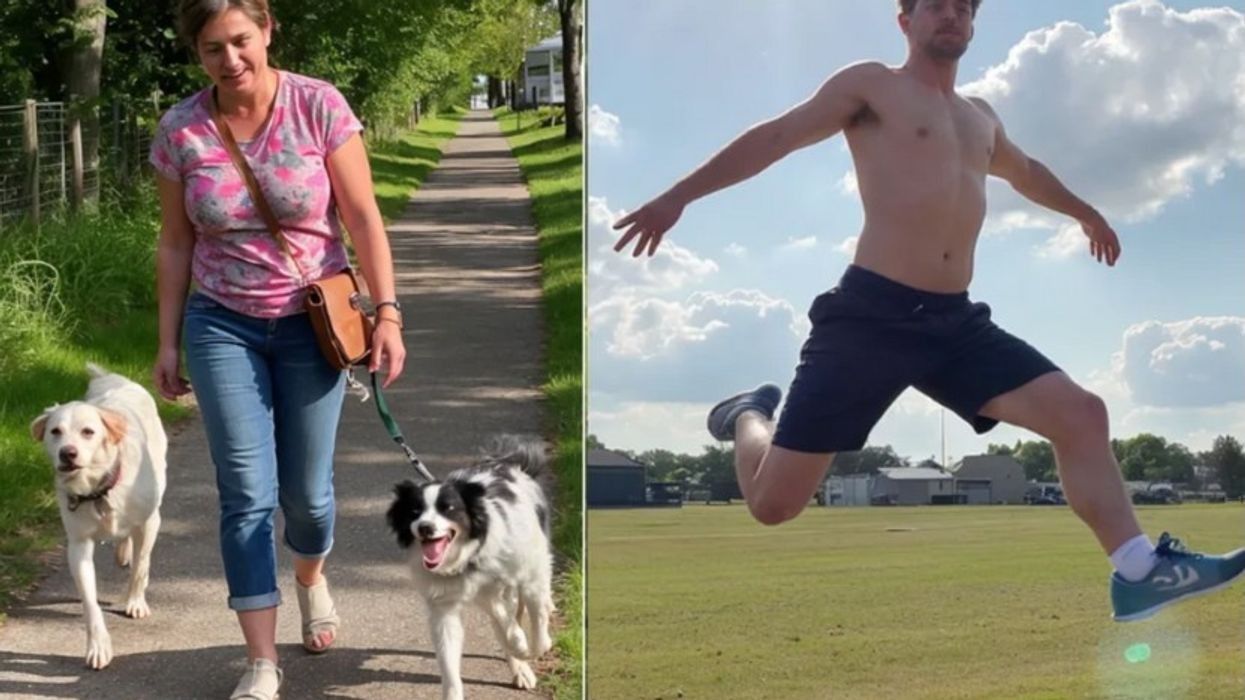Article originally appeared on 03.28.10.
InThe history of describing (and transcribing) dog words into English.
If your dog is anything like my dog, you've been privy to some wild, far-out noises that aren't quite covered by the words "bow-wow," "woof," "arf," and "bark." Whether he's happy, sad, bored, playful, edgy, or excited, my rat terrier Monkey makes indescribable, untranslatable sounds that only a recording could capture:
Any attempt to put Doglish into English is doomed from the start.Impossible task or not, people have been trying to describe (or transcribe) dog sounds as long as people have loved (and had to listen to) dogs. It's no secret that other languages have their own interpretations: for example, dog barks are expressed as "vov-vov," "chau-chau," "kian-kian," "hev-hev," and "guf-guf," in Danish, Russian, Japanese, Turkish, and Spanish respectively.
It's not-so-well-known that there's been just as much variation within English when it comes to reporting the yip-yaps and bow-wows of our pooches and pals. What follows are some facts from the Oxford English Dictionary-the Bible of the English language, though with fewer lepers and smitings-on the history of our attempts to speak for and about dogs.The Oxford English Dictionary's latest update included a long overdue entry for "arf," which is first recorded in a 1918 cartoon caption: "I'll be leader for a game of foller [sic] the leader... Tweet, tweet... Eek, eek... Arf, arf, arf!”
Since the early thirties, "arf arf" has done double duty, as it also imperfectly represents laughter. In a note on the OED update, Managing Editor Michael Proffitt noted a cartoony common denominator: "... both senses of arf were popularized by their associations with irrepressible icons of American comic strips: Little Orphan Annie and Popeye the Sailor. Sandy, Little Orphan Annie's ‘canine companion', wasn't the first cartoon dog to utter an arf, but his was the bark heard around the world (or at least read across America, in Harold Gray's widely syndicated cartoon). ""Arf" is not far sound-wise from a bunch of terms meaning canine growling and/or snarling, such as the onomatopoeic "grrrr" and the now-obscure "yar" (1300s), "hurr" (1636), "harr" (1387), "narr" (1509), "gnar" (1496), and the piratical "arr" (1483).Another grrr-y word is "girn": a variation of "grin" that also means "To show the teeth in rage, pain, disappointment, etc.; to snarl as a dog; to complain persistently; to be fretful or peevish.” Appropriately enough, "r" is known as the "dog's letter," a term anticipated by this quote from Romeo and Juliet: "Doth not Rosemarie and Romeo begin both with a letter?.. Both with an R... A mocker! that's the dogs name. "If "r" is the dog's letter, "f" must be the runner-up. "Blaff," "baff," "buff," "nyaff," "yaff," "yaffle," and even "waffle" have all been used to describe barks, not to mention "woof"-the valedictorian of dog words (except for maybe "bow-wow," first found in the 1500s and sometimes spelled "bowgh-wawgh," "bough-wough," and "baw-waw").
Woof (around since 1804) has close relatives that include "wuff," "ouff," "owff," "wowff," and "waff." This 1894 citation semi-helpfully explains: "A dog ‘woughs', but a puppy waffs." Maybe because it's so fun to say, "woof" has taken on plenty of non-dog meanings over the years. Since 1934, it's been African-American slang for talking "in an ostentatious or aggressive manner," and since 1943, it's been used to mean "consume ravenously." To illustrate all three meanings, this morning I woofed down a full stack of Swedish pancakes with lingonberries, then I woofed about it to my dog, who woofed in response.
Another article could have been written on howling, that specialty of dogs, wolves, and werewolves.
"Howl" itself has been used since 1390, and there have been plenty of regional, colloquial, technical, and dialectical synonyms, including "blart," "gowl," "gurl," "exululate," "waul," "whewl," "woul," "ululate," "wowl," "yarm," "yerr," "yoll," and "yowt." Though it mainly describes human-ish howling, I love the Irish English word "pillaloo," which is used in a sad yet charming sentence here: "Nanny sitting in the chimney corner whillilew-ing and pillillew-ing, crying the very eyes out of her head" (1899).My dog is likewise fond of whillilew-ing and pillillew-ing as he impatiently waits for the elevator to carry him to a playdate with his buddy Jed.
Most of these words are near-extinct or totally deceased, but like a death in the first 20 minutes of a zombie movie, things can change. Some could be sleeping beauties, like "unfriend" and "truthiness," ready to burst into popular use after centuries of sack time. Could you be the Stephen Colbert of one of these words? I doubt it, but you never know: If "yaffle," "girn," or "ouff" sound right to you, use them next time you write a blog entry, short story, or New Yorker cartoon submission about your dog. Your humble writer and the not-so-humble, ginormous OED will back you up.
Plus, as this metric dogload of lost words indicates, there's always room for more.
If your ears and alphabet tell you that your dog goes "frolf," "googa-boo," or "rrrr-hrrrr-mrrrrr," don't be afraid to say so. Maybe you'll even figure out which words best represent "back off, buddy" and "let's play, dude!" to dogs. Human spelling will always lag behind dog barking-so you should pillaloo and yawp and gnar as you see fit.
















 Otis knew before they did.
Otis knew before they did.